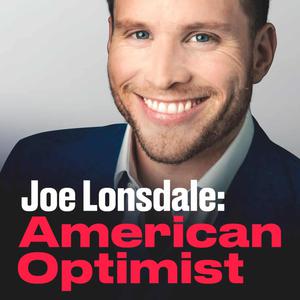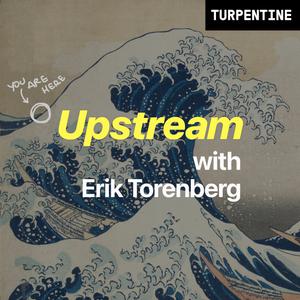
Joe Lonsdale: American Optimist
Joe Lonsdale
Ideas and dialectic on technology, policy & philosophy.
- 40 minutes 20 secondsEp 89: Coleman Hughes on "The End of Race Politics" & the Worst Ideas Done in the Name of Diversity
At Columbia University's freshman orientation, Coleman Hughes and his classmates were separated into groups by skin color to discuss the effects of racism, with minorities portrayed as victims and white students as beneficiaries. Why have exercises like this become commonplace in elite institutions? How did this neo-racism take hold? And what are the counter-arguments and better approaches to race and diversity?
These questions are at the heart of Coleman's new book: "The End of Race Politics: Arguments for a Colorblind America." A talented, rising public intellectual, Coleman was one of the first courageous voices pushing back against the "anti-racist" pablum popularized by Ibram Kendi and Robin DiAngelo. He's a contributor to The Free Press, analyst at CNN, and host of the popular podcast "Conversations with Coleman."
In this episode, Coleman argues for a return to colorblindness and the ethics of MLK — not that we pretend we can't see race, but that we strive to move beyond it and focus on character, culture, and merit instead. He makes the case that socioeconomic factors, not race, are more accurate proxies for helping the most disadvantaged in society, and our public policy should be oriented as such. He also exposes the lazy thinking and platitudes that permeate conversations about race, along with some of the worst ideas done in the name of diversity, such as rejecting standardized tests. Finally, we discuss a better way to acknowledge America's past sins while moving forward in a way that unites our country.
This is a public episode. If you would like to discuss this with other subscribers or get access to bonus episodes, visit blog.joelonsdale.com16 May 2024, 6:46 pm - 46 minutes 21 secondsEp 88: A Conversation with MLK's Attorney & Speechwriter: Dr. Clarence Jones
Dr. Clarence Jones is a giant of the civil rights movement. As the personal attorney and speechwriter for Dr. Martin Luther King Jr., he risked everything to help save the soul of America, including smuggling scraps of papers in and out of Birmingham prison that would become Dr. King's Letter from Birmingham Jail. In fact, Dr. Jones never thought he'd live to see the age of 50.
Today, he's 93 years old, and one of the last living civil rights icons. In this episode, we trace the journey of an American hero — the son of domestic servants who became valedictorian of his high school and studied at Juilliard before becoming a successful entertainment lawyer. That is until Dr. King showed up at his California home asking for legal assistance. After initially turning him away, he went to hear Dr. King preach, and his life — and the direction of our country — changed forever.
We discuss the key moments in his fight for justice, the significance of the black-Jewish alliance, and the legacy of Dr. King, including his thoughts on today's debate over DEI, Critical Race Theory, and colorblindness. He also shares his powerful approach to radical non-violence and his advice for young people today: pursue excellence. Dr. Jones has lived an extraordinary life, and his wisdom on issues of race should be heeded over many of the voices in popular culture today.
SHOW NOTES:
Dr. Jones was recently awarded the Presidential Medal of Freedom, the Nation's highest civilian honor.
Last year, Dr. Jones released his memoir, "Last of the Lions."
Learn more about Dr. Jones' work through his foundation and as Chair of the Spill the Honey Foundation, which continues the legacy of the Black-Jewish Alliance.
This is a public episode. If you would like to discuss this with other subscribers or get access to bonus episodes, visit blog.joelonsdale.com10 May 2024, 7:45 pm - 34 minutes 32 secondsEp 87: Dr. Cliff Winston — Deregulate Lawyers, Deregulate Airlines, and Let Markets Correct Themselves
Are government programs and interventions superior to market corrections? According to Dr. Cliff Winston, the evidence to support such a claim doesn’t exist. Many economists obsess over market failures but seldom point the microscope in the direction of government, despite its many failures. And worse, the bureaucracy doesn't hold itself accountable.
This week, we examine some of the flaws of modern economic theories with Dr. Winston, a microeconomist and Senior Fellow at the Brookings Institution, with a B.A. and Ph.D. in economics from UC Berkeley, and Masters from the London School of Economics. He is the author of numerous books and papers, including, most recently, “Indispensable: Market corrections in a U.S. economy beset by government failures.”
From antitrust to welfare programs and tax incentives, most Americans assume government interventions are preferable to allowing the market to correct itself, but as Cliff explains, we don't have scholarly evidence to back that up. He explains why we need government retrospectives and more widespread experiments to test what does or doesn't work. When has government been effective? Ironically, Cliff says, when it gets out of the way: deregulation. We talk about the benefits of airline deregulation, for example, and Cliff makes the case for deregulating the legal profession and other areas that require occupational licensure. Finally, we discuss scenarios where government involvement could be beneficial, such as setting adoption standards for autonomous vehicles.
This is a public episode. If you would like to discuss this with other subscribers or get access to bonus episodes, visit blog.joelonsdale.com2 May 2024, 4:23 pm - 32 minutes 39 secondsEp 86: How to Design a STEM Curriculum for the 21st Century with Dr. David Ruth
STEM (science, technology, engineering & math) education is the backbone of the innovation economy. Yet at many schools, it's become stodgy and irrelevant to solving real-world problems. Not surprisingly, many of the best minds forgo college or drop out. What would it look like to design a STEM program that is inspiring, cutting-edge, and grounded in timeless truths? And how do you educate the next generation of great entrepreneurs who are also citizens of virtue?
This week, we discuss a better model for STEM with Dr. David Ruth, Dean of the Center for STEM at the University of Austin (UATX). Dr. Ruth is a retired U.S. Navy Captain who worked on a nuclear attack submarine, an aircraft carrier, and as a war planner in Asia, before teaching advanced mathematics at the U.S. Naval Academy for 13 years.
In this episode, Dr. Ruth lays out UATX's approach to 21st-century STEM: a curriculum that balances first principles with practical application and unparalleled industry engagement. (We're already partnering with The Boring Company and other leading companies in Texas!) Many STEM programs bog down students in unnecessary tasks; UATX is taking a different approach with "computation-enabled thinking" that combines what humans do best (abstracting, modeling, and interpreting) with what computers do best (computation). We also discuss how to safeguard science and math from identity politics, and the importance of making STEM exciting and challenging through innovative games and challenges. If you're a student pursuing a STEM education, we hope you'll check out what we're building at UATX.
This is a public episode. If you would like to discuss this with other subscribers or get access to bonus episodes, visit blog.joelonsdale.com25 April 2024, 3:24 am - 38 minutes 34 secondsEp 85: The Path to Regime Change in Iran with Crown Prince Reza Pahlavi
In 1979, Crown Prince of Iran Reza Pahlavi was attending fighter pilot school in Lubbock, Texas when the Islamic Revolution overthrew his father's reign. A radical theocracy seized power and began extinguishing freedoms, persecuting minorities, and taking a pro-Western Iran back to the Middle Ages. Since then, the Crown Prince has lived in exile as a leading voice for a secular and democratic Iran. What is his view of the Revolution? Why does he believe regime change is possible today? And how should the U.S. and the West deal with Iran?
Given Iran's recent attack on Israel, we get a rare and timely perspective on the power dynamics within Iran and why the current regime is more fragile than we realize. The Crown Prince paints a picture of his homeland pre-and-post Revolution, and explains why many governments misunderstand the fanatical leadership of Iran. He lays out his strategy of "maximum support" and how combining sanctions and external pressure with internal support, such as internet access and financial resources for protestors, could someday topple the regime. And if it does, he details a post-regime strategy to transition the government toward a secular democracy. We also discuss the longstanding history between the Persian and Jewish people, and how, with the right leadership, the region could once again become dynamic and prosperous.
[NOTE: this conversation was recorded shortly before Iran launched hundreds of missiles and drones at Israel.]
This is a public episode. If you would like to discuss this with other subscribers or get access to bonus episodes, visit blog.joelonsdale.com18 April 2024, 2:10 am - 30 minutes 2 secondsEp 84: Sri Ganesan on Freshworks' Big Win, Building Rocketlane & India's Tech Boom
India’s tech ecosystem has hit an indisputable inflection point in recent years. For decades, American corporations outsourced basic services to India, while India outsourced its top talent to Silicon Valley. But today, India’s tech economy boasts homegrown software giants and a flourishing startup scene.
This week, we get a front-row look into India’s startup evolution with one of its top talents: Sri Ganesan, Founder and CEO of Rocketlane. His first company, Konotor, was acquired into Freshworks, which went public in 2021 for $10 billion and became one of India's biggest wins. Now, Sri is building Rocketlane into a leading solution for SaaS deployment and professional services automation, with teams in the U.S. and India. By combining American know-how with Indian talent, Rocketlane represents an important dynamic for the future of tech and expanding key partnerships around the world.
In this episode, we dive into the lessons learned from Freshworks's success and how it paved the way for greater entrepreneurial risk within India. We also explore Sri's journey in scaling Rocketlane, from finding product-market fit to positioning the company to take advantage of the AI wave. We discuss what India’s rise to become one of the world's most important economies means for the future of tech and global talent distribution, along with the cultural differences between India and the US, and what it's like building on two continents simultaneously. Finally, Sri guides us through the various tech hubs in India, from Mumbai to Bangalore and Chennai, even down to his favorite restaurant and must-visit destinations for anyone heading to India soon.
This is a public episode. If you would like to discuss this with other subscribers or get access to bonus episodes, visit blog.joelonsdale.com11 April 2024, 5:43 pm - 32 minutes 16 secondsEp 83: A New Cancer Breakthrough with Ivan Dimov of Orca Bio
Every year, more than 20,000 Americans receive a bone marrow transplant — a Nobel prize-winning procedure that saves many lives but also carries great risk. For leukemia patients, it's a choice of last resort, as nearly 20% die from the transplant. Ivan Dimov, co-founder & CEO of Orca Bio, and his team have created a novel cell therapy alternative that has already saved over 400 lives in clinical trials with virtually zero rejection!This week, we dive into Ivan's journey, the science behind Orca's cancer breakthrough, and the potential of cell therapies to cure a host of other diseases. By discovering new, high-precision methods to manipulate cells, Orca is able to provide leukemia patients with a designer immune system that attacks the cancer while nearly eliminating rejection. By safely rebooting the immune system, Ivan and his team believe Orca also has the potential to cure autoimmune diseases like Crohn’s disease and multiple sclerosis, and impact the lives of millions of Americans.Orca is currently seeking the first-ever FDA approval in this space, and since it's a unique one-time curative therapy, they are also commercializing the drug in-house — a rare move in biopharma. Ivan walks us through the path to bringing Orca's products to market, from collaborating with regulators to negotiating with insurance companies and scaling up its manufacturing. Though many challenges remain, you'll see why we're incredibly bullish on Ivan's leadership and Orca's potential to transform the future of medicine.
This is a public episode. If you would like to discuss this with other subscribers or get access to bonus episodes, visit blog.joelonsdale.com5 April 2024, 1:36 pm - 40 minutes 33 secondsEp 82: Whitney Baker's Masterclass on Macro Investing & the State of the Economy
What are the forces behind the scenes that drive financial markets? How do bubbles form — and are we in one now? What do the world's best investors understand and how do they consistently come out ahead?
This week we dive into global finance with one of the sharpest minds in macro investing: Whitney Baker, Founder and Chief Investment Officer of Totem Macro. Whitney previously worked at two of the world's leading investment firms, first in global macro & long/short strategies at Soros Fund Management and most recently as the Head of Emerging Markets at Bridgewater Associates.
In this episode, Whitney lays out the principles behind macro investing and how credit flows, borrowing cycles, and monetary policy drive global finance. She traces our current-day situation back to the 1970s when President Nixon ditched the gold standard and opened trade with China. She explains how a new age of deficit spending combined with China entering the U.S. bond market paved the way for the dot com bubble, and ultimately where we are today. Whitney makes the case that inflation isn't going away soon and believes the Federal Reserve's actions over the past few decades have exacerbated inequality in America. Yet, despite these headwinds, Whitney believes technological progress can sustain the U.S. through these challenging times, so long as we set the right conditions for our best entrepreneurs to succeed.
Thanks for reading! Subscribe for free to receive new posts and podcasts.
This is a public episode. If you would like to discuss this with other subscribers or get access to bonus episodes, visit blog.joelonsdale.com21 March 2024, 11:08 pm - 33 minutes 34 secondsEp 81: How Palantir Star Tyler Scriven Is Helping Small Businesses Compete Against Amazon
U.S. e-commerce sales eclipsed $1 trillion last year and are expected to double or triple over the next decade. As online demand increases, how can small businesses compete with retail giants like Amazon and Walmart? What capabilities do they need? And can a new model help level the playing field?
This week, we explore the future of logistics and e-commerce with Tyler Scriven, co-founder and CEO of Saltbox. Tyler was a star talent at Palantir for many years (his first job title was "Predictor and Crusher" on account of his ability to eliminate operational challenges) before applying his learnings to help entrepreneurs nationwide. He identified a key gap in the market: small businesses have great software tools, but need help in the physical world with supply chain and logistics to compete against large retailers with scale advantages. With a dozen locations in major metropolitan areas, Saltbox provides a unique co-warehousing model to elevate storage and shipping capabilities.
In this episode, we discuss Tyler's most important lessons from Palantir and how to cultivate a mission-driven culture. We cover his entrepreneurial journey from Palantir to acquiring his own small business and discovering the logistical shortcomings that Saltbox is designed to solve. We also talk leadership lessons and Tyler's compelling perspective on "courage for normal people."
This is a public episode. If you would like to discuss this with other subscribers or get access to bonus episodes, visit blog.joelonsdale.com14 March 2024, 8:17 pm - 35 minutes 57 secondsEp 80: Leonard Leo's Winning Strategy to Rebuild Institutions, Accelerate Innovation, and Save Our Country
Leonard Leo is one of the most effective agents of legal and cultural change in America today. What's his playbook? How can we apply it to other broken areas of society? And why should the technology world be especially interested in his work?
In the mid-20th century, the U.S. judicial system took a sharp left turn, resulting in hyper-politicized courts, runaway bureaucracies, and many other distortions of our Constitutional system. Through his leadership of the Federalist Society, Leonard has led the charge to repair these broken institutions and, in the process, built arguably the most powerful legal network in the nation. He's been instrumental in the most important judicial elections and nominations of the past few decades.
Leonard's wisdom is especially relevant for my friends in the effective accelerationism (e/acc) movement — or anyone who values technological progress. Standing athwart innovation is the ever-expanding administrative state, and Leonard has spent decades fighting to rightsize government and restore the separation of powers. He explains why property rights, limited government, and decentralized power are the bulwark of innovation, and why technologists must also join the effort to rein in the regulatory state and defend these sacred Constitutional principles.
This is a public episode. If you would like to discuss this with other subscribers or get access to bonus episodes, visit blog.joelonsdale.com8 March 2024, 3:12 am - 45 minutes 15 secondsEp 79: Bjorn Lomborg and the 12 Best Policies to Help the World
What are the single most effective policies for helping the world's poor? And what are we doing right now that's ineffective and should be stopped? The answers may surprise you.
In his latest book "Best Things First," Bjorn Lomborg reveals the 12 best solutions to address the most pressing global challenges. He gathered the world's top economists to analyze the policies that would do the most good for the least amount of money. It turns out the United Nations and others are getting it wrong — climate policies didn't make Bjorn's list!
In 2015, the UN released its Sustainable Development Goals — a mere 169 promises to achieve by 2030! Yet as Bjorn explains, these are largely virtue signaling or ineffective vows the UN will never make good on. Instead of overpromising or obsessing over climate change, Bjorn says the evidence points to 12 clear and measurable policy solutions: eliminating tuberculosis, investing in education the right way, and establishing clear land rights, to name a few.
Bjorn is the Founder and Director of the Copenhagen Consensus think tank and one of the world's most influential writers and thinkers. He's made a career challenging misguided narratives, especially on environmental issues, while fighting to restore sanity and fact-based policymaking. His arguments are a direct challenge to the alarmism and doomerism surrounding us today, which is why YouTube and others try to censor him!
This is a public episode. If you would like to discuss this with other subscribers or get access to bonus episodes, visit blog.joelonsdale.com29 February 2024, 9:29 pm - More Episodes? Get the App
Your feedback is valuable to us. Should you encounter any bugs, glitches, lack of functionality or other problems, please email us on [email protected] or join Moon.FM Telegram Group where you can talk directly to the dev team who are happy to answer any queries.
 All-In with Chamath, Jason, Sacks & Friedberg
All-In with Chamath, Jason, Sacks & Friedberg
 "Moment of Zen"
"Moment of Zen"
 "Upstream" with Erik Torenberg
"Upstream" with Erik Torenberg
 Pirate Wires
Pirate Wires
 The Ben & Marc Show
The Ben & Marc Show
 BG2Pod with Brad Gerstner and Bill Gurley
BG2Pod with Brad Gerstner and Bill Gurley